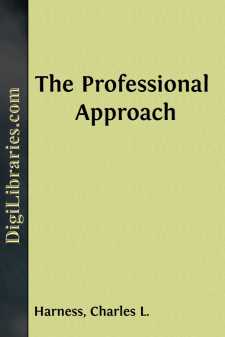Categories
- Antiques & Collectibles 13
- Architecture 36
- Art 48
- Bibles 22
- Biography & Autobiography 813
- Body, Mind & Spirit 142
- Business & Economics 28
- Children's Books 15
- Children's Fiction 12
- Computers 4
- Cooking 94
- Crafts & Hobbies 4
- Drama 346
- Education 46
- Family & Relationships 57
- Fiction 11828
- Games 19
- Gardening 17
- Health & Fitness 34
- History 1377
- House & Home 1
- Humor 147
- Juvenile Fiction 1873
- Juvenile Nonfiction 202
- Language Arts & Disciplines 88
- Law 16
- Literary Collections 686
- Literary Criticism 179
- Mathematics 13
- Medical 41
- Music 40
- Nature 179
- Non-Classifiable 1768
- Performing Arts 7
- Periodicals 1453
- Philosophy 64
- Photography 2
- Poetry 896
- Political Science 203
- Psychology 42
- Reference 154
- Religion 513
- Science 126
- Self-Help 84
- Social Science 81
- Sports & Recreation 34
- Study Aids 3
- Technology & Engineering 59
- Transportation 23
- Travel 463
- True Crime 29
The Professional Approach
Categories:
Description:
Excerpt
"Sometimes," said Helix Spardleton, Esquire, "a patent case gets away from you. As the attorney in the case, you never quite see it the same as everybody else. You stand isolated and alone, unable to persuade the Patent Examiners, the Board, the courts, possibly even the inventor, to accept your view of the case. Nothing you do or say matches anyone else's thinking, and you begin to wonder what's the matter with everyone."
I nodded. This was my favorite time of day. It was early evening in Washington, D.C., and my boss, Helix Spardleton, patent attorney extraordinary, was relaxing. His feet were up on one corner of his desk, his cigar was in the Contemplation Position, and the smoke curled slowly toward the ceiling. His office was a good room in which to relax. It was filled with fine, old well-scratched furniture, and the walls were lined with books, and there was the comfortable picture of Justice Holmes on the wall looking down with rare approval on what he saw. Susan, our secretary, had made the last coffee of the day, and had kicked off her shoes the better to enjoy it. The three of us just sat in the deepening dusk, and talked. We didn't even turn on a light. It was a shame I wasn't paying close attention to Mr. Spardleton.
I said, "Yes, I know what you mean about other people's not seeing things the same way you do. I've seen something like it at work with some of my friends just before they get married. They think their brides are just about the most beautiful women in the world, when they are really quite homely—wouldn't even hold a candle to our Susan here."
Mr. Spardleton looked at me and then at Susan, and Susan looked at him and then at me in that sober wide-eyed way she has, and then they looked at each other and smiled. I guess they realized that I had said something pretty funny.
Mr. Spardleton said, "I understand why you think of the situation in terms of brides, but I always think of it in terms of a proud father who sees nothing but perfection in his newborn son."
"Yes," I said, "that's a good way to put it, too."
"There are," he continued through a cloud of gentle smoke, "two different ways in which a patent case can get away from the attorney. The first doesn't happen very often, but when it does it has a tendency to set the world on fire. That's the case that has true merit to it—high invention, if you will—but the invention is so subtle that nobody can see its importance. Only the attorney who wraps the case around his heart can appreciate its vast potential. He goes through the prosecution before the Patent Office and possibly before the courts shouting high praises of the invention, but all the tribunals turn a deaf ear. Sometimes the attorney finally reaches Nirvana; the invention comes into its own. It shakes the world, just as the attorney had always known it would."
I nodded and said, "Elias Howe and his sewing machine, McCormick and his reaper, Colt and his pistol." Mr. Spardleton had taught me well.
"The other way is more common," he continued. "There the attorney never sees the case in its true light. He is blinded by something in it and thinks it is greater than it is. He wastes a lot of time trying to persuade everybody that this very ordinary invention is the wonder of the decade. He thinks of the invention the way a father does of a wayward son—he sees none of its faults, only its virtues, and he magnifies those."
I shifted into a more comfortable position in my deep chair....


